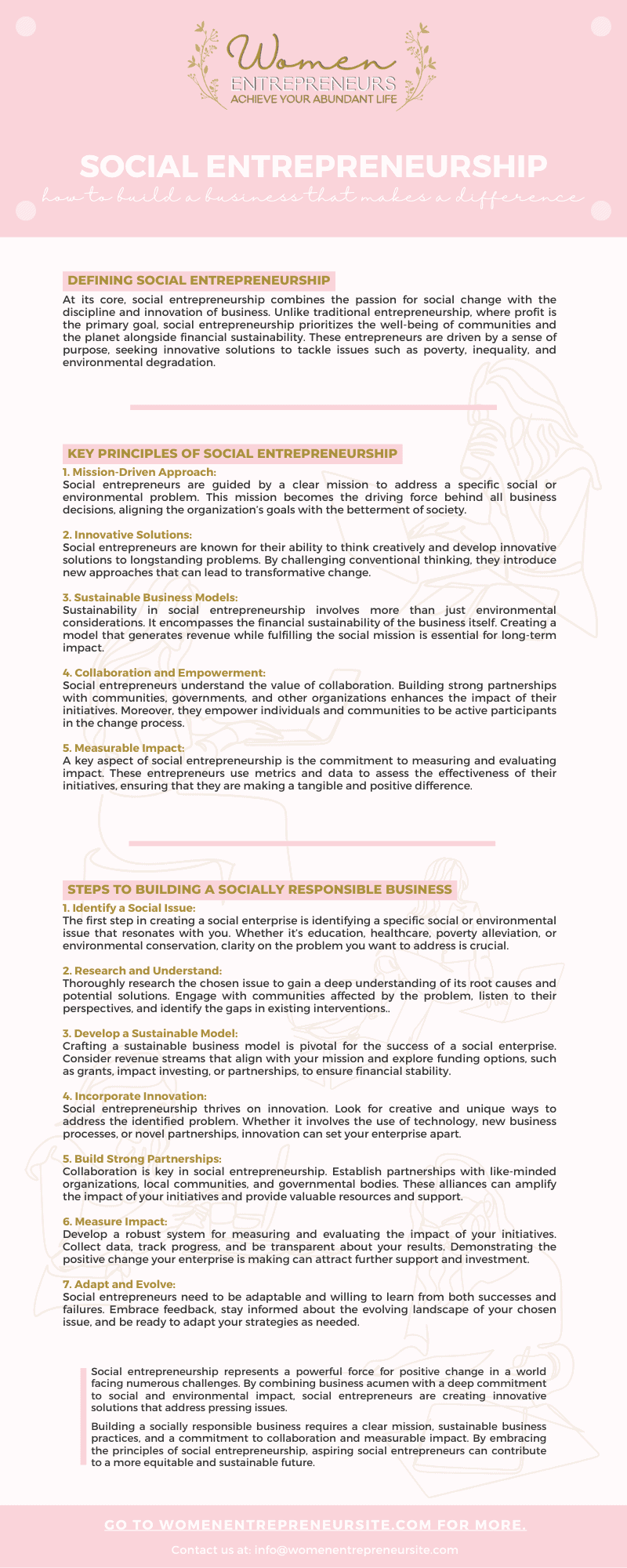In the realm of professional growth, there comes a pivotal moment for many individuals when the…
Social Entrepreneurship: How to Build a Business That Makes a Difference

In an era marked by increasing global challenges, the concept of social entrepreneurship has gained prominence as a powerful force for positive change. Social entrepreneurs are individuals who leverage business principles to address pressing social and environmental issues while sustaining economic viability.
This article delves into the essence of social entrepreneurship, exploring its defining features, key principles, and providing insights on how aspiring entrepreneurs can build businesses that make a lasting impact on society.
Defining Social Entrepreneurship
At its core, social entrepreneurship combines the passion for social change with the discipline and innovation of business. Unlike traditional entrepreneurship, where profit is the primary goal, social entrepreneurship prioritizes the well-being of communities and the planet alongside financial sustainability. These entrepreneurs are driven by a sense of purpose, seeking innovative solutions to tackle issues such as poverty, inequality, and environmental degradation.
>> Buy your own Wifi now! Manage your Social Media anytime, anywhere:
Key Principles of Social Entrepreneurship
1. Mission-Driven Approach:
Social entrepreneurs are guided by a clear mission to address a specific social or environmental problem. This mission becomes the driving force behind all business decisions, aligning the organization’s goals with the betterment of society.
2. Innovative Solutions:
Social entrepreneurs are known for their ability to think creatively and develop innovative solutions to longstanding problems. By challenging conventional thinking, they introduce new approaches that can lead to transformative change.
3. Sustainable Business Models:
Sustainability in social entrepreneurship involves more than just environmental considerations. It encompasses the financial sustainability of the business itself. Creating a model that generates revenue while fulfilling the social mission is essential for long-term impact.
4. Collaboration and Empowerment:
Social entrepreneurs understand the value of collaboration. Building strong partnerships with communities, governments, and other organizations enhances the impact of their initiatives. Moreover, they empower individuals and communities to be active participants in the change process.
5. Measurable Impact:
A key aspect of social entrepreneurship is the commitment to measuring and evaluating impact. These entrepreneurs use metrics and data to assess the effectiveness of their initiatives, ensuring that they are making a tangible and positive difference.
7 Steps to Becoming a Network Marketing Professional
More than two decades ago, Eric Worre experienced a transformative moment during a corporate event, which led him to commit to becoming an accomplished professional in network marketing. Since then, he has concentrated on acquiring the necessary skills to succeed, positively influencing numerous individuals worldwide. Through his teachings, Worre imparts his knowledge and offers guidance on deciding whether to pursue network marketing professionally and achieve the life of your aspirations.
Steps to Building a Socially Responsible Business
1. Identify a Social Issue:
The first step in creating a social enterprise is identifying a specific social or environmental issue that resonates with you. Whether it’s education, healthcare, poverty alleviation, or environmental conservation, clarity on the problem you want to address is crucial.
2. Research and Understand:
Thoroughly research the chosen issue to gain a deep understanding of its root causes and potential solutions. Engage with communities affected by the problem, listen to their perspectives, and identify the gaps in existing interventions.
3. Develop a Sustainable Model:
Crafting a sustainable business model is pivotal for the success of a social enterprise. Consider revenue streams that align with your mission and explore funding options, such as grants, impact investing, or partnerships, to ensure financial stability.
4. Incorporate Innovation:
Social entrepreneurship thrives on innovation. Look for creative and unique ways to address the identified problem. Whether it involves the use of technology, new business processes, or novel partnerships, innovation can set your enterprise apart.
5. Build Strong Partnerships:
Collaboration is key in social entrepreneurship. Establish partnerships with like-minded organizations, local communities, and governmental bodies. These alliances can amplify the impact of your initiatives and provide valuable resources and support.
6. Measure Impact:
Develop a robust system for measuring and evaluating the impact of your initiatives. Collect data, track progress, and be transparent about your results. Demonstrating the positive change your enterprise is making can attract further support and investment.
7. Adapt and Evolve:
Social entrepreneurs need to be adaptable and willing to learn from both successes and failures. Embrace feedback, stay informed about the evolving landscape of your chosen issue, and be ready to adapt your strategies as needed.
Tricks on How to Talk to Anyone
Throughout her professional journey, she has dedicated herself to educating people on the art of effective communication. In her book, “How to Talk to Anyone,” Lowndes presents 92 practical and efficient techniques for achieving success, starting from initial interaction strategies to advanced tactics used by accomplished individuals.
Final Thoughts
Social entrepreneurship represents a powerful force for positive change in a world facing numerous challenges. By combining business acumen with a deep commitment to social and environmental impact, social entrepreneurs are creating innovative solutions that address pressing issues.
Building a socially responsible business requires a clear mission, sustainable business practices, and a commitment to collaboration and measurable impact. By embracing the principles of social entrepreneurship, aspiring social entrepreneurs can contribute to a more equitable and sustainable future.









